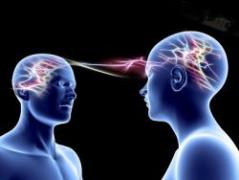 The child stares astonished at the world… he /she observes and then imitates. A capacity empowered by neurons especially active at first years of life: mirror neurons. Neurons that are activated in the same way when they observe an outside movement and when it is done by themselves. Human development leads to a unconcius process of tons of information, emotionally reacting to it. Information expressed in the face, body and facial and gestures, that we started to imitate internally.
The child stares astonished at the world… he /she observes and then imitates. A capacity empowered by neurons especially active at first years of life: mirror neurons. Neurons that are activated in the same way when they observe an outside movement and when it is done by themselves. Human development leads to a unconcius process of tons of information, emotionally reacting to it. Information expressed in the face, body and facial and gestures, that we started to imitate internally.
Certain people have the ability to quickly recognize how may feel people that they observe. Given that it’s been investigated that people with autism show a dysfunction in this kind of neurons, we could argue that there may be a relation between empathy and this neuron development. As they function automatically, it seems to indicate that, in a unsuspected way, emotional education may be exercised in the first years of life, trough psychomotoricity imitation playing.
This capacity, linked to mature emotional intelligence, could be developed paying conscious attention to the facial expression of whom we’re speaking with. A relaxed attention, without intention of “analyzing”, allows these neurons to function properly, and allow us to feel what inner emotions surge. We have learnt to defend on our own empathetic capacities. It’s uncomfortable to cry when we’re watching a dramatic film. It’s uncomfortable to feel the despair of whom ask us for money at the street. We come to learn, in this way, to be insensitive.
The intelligence of heart leads to a wiser management of our empathy. An intelligence that we can exercise and develop, as far as we can observe our emotions. A step forward that allow us to feel, at the same time that we realize the external origin of that emotional reaction. Generally speaking, we avoid people who share their sadness, because it connects us with memories congruent with that emotional state. The key to wisely join the other emotional stat is to realize that what we are feeling is actually a glimpse of what is feeling that person. We can see them as “borrowed emotions” for we don’t have to feel responsible. In this sense, the sadness I feel when I speak with a sad person, it’s not “mine”. If I speak to a angry person, I can feel the typical angry reactions in me, but I can realize that that anger it´s not of my own.
This observation and attributional shift is linked with a sort of “emotional prophylaxis”. In situations of emotional contagion, like a panic situation, one can observe how one is breathing those emotions of people around us, without acting in a automatic and reacting manner. The choice of keeping calm and serene, at the same time that feel empathetic, makes that nonetheless our actions can be more congruent with what it’s being felt by our conversational partners. In this way, we wisely use our emotional biologic mirror, when we can be conscious that it’s a mere reflection. We realize that the knife reflected in a mirror, although can frighten us, is not going to cut us. We stop being afraid of that borrowed emotions, that as internal radars, give us relevant information from the environment.
To live disconnected of our capacity of observing our emotions, sum up to the fact that don’t wanting to listen them, can make that this reflexive mechanism start to function inversely, coloring and distortioning the reality perceived. We see then our own emotions in the mirror shown by other people. That sad face you see… is a reflection of your own sadness? The ability to discern between our own emotions and the one projected to others, and the ones that come from other people and resonate in my perception field, counts for a balanced emotional life, and gives support to the emotional intelligence development.
José Miguel Sánchez Cámara

Pingback: Can you feel another person? | Otrazhenie
Reblogged this on Counseling TidBits and commented:
Thanks for this! I first heard about the mirror neuron watching “I Am”! 🙂
Pingback: How to Use Social Media to Increase Your ConversionsJeremy Said